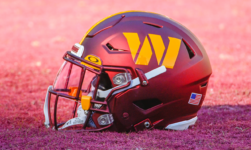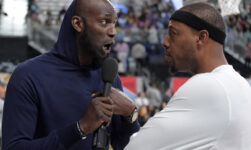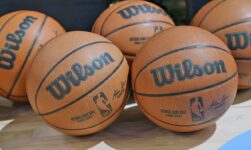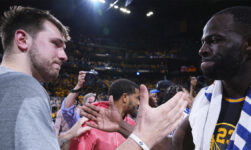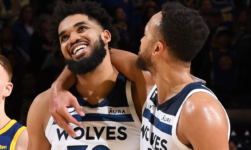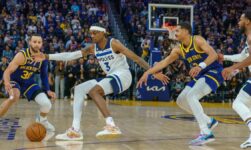Russell Westbrook is learning the most important of lessons about being LeBron James’ teammate in the most brutal of ways: Everything you thought you knew about life in the NBA is enhanced and magnified when you play with the King.
LeBron is an amplifier. And Westbrook is learning firsthand the fact that the physics of LeBron’s world are not the same as those for the rest of the league.
Everything shifts, expands and shrinks. The spotlight. Your money. Your very standing.
And when you fail — as a team, as a player, as the Lakers and Westbrook clearly have together — the physics of LeBron’s world can be brutal.
Please check the opt-in box to acknowledge that you would like to subscribe.
Thanks for signing up!
Keep an eye on your inbox.
Sorry!
There was an error processing your subscription.
The Lakers are 28-36. They are ninth in the Western Conference and 4.5 games behind the eighth seed with 18 games left in the regular season, meaning they may need to win two games in a row simply to advance to a seven-game series they’ll almost certainly lose.
Bad times indeed.
And in this worst-Lakers timeline reality, the heat, as it does, has fallen far and wide. On Anthony Davis. On head coach Frank Vogel, who The Athletic reported is likely to be fired barring a postseason miracle, a fact CBS Sports has confirmed. On LeBron, to a degree. And very much on Westbrook and his struggles.
Enter the “Westbrick” chants that have proliferated.
“When it comes to basketball,” Westbrook told the media Monday night, after another Lakers loss, this one to the Spurs, “I don’t mind the criticism of missing and making shots. But the moment it becomes where my name is getting shamed, it becomes an issue.”
What he said next is fair. It’s reasonable, to a degree, if fairness ruled. But, as Clint Eastwood said in his movie “Unforgiven,” “Deserves got nothing to do with it.”
“I’ve kind of let it go in the past because it never really bothered me,” Westbrook continued. “But it really kind of hit me the other day. Me and my wife were at teacher-parent conferences for my son. And the teacher told me, ‘Noah, he’s so proud of his last name. He writes it everywhere. He writes it on everything. He tells everybody and walks around and says, ‘I’m Westbrook.’ … And I kind of sat there in shock, and it hit me, like, ‘Damn. I can no longer allow people [to besmirch my name].'”
It’s reasonable for Westbrook to not want his last name used as a taunt. When you’re a father, things look different. It’s also true — quite true — that being mocked is part of the reality of playing in the NBA.
Why, now, after so many years of both excellence and inevitable letdowns — and the accompanying ridicule — is Westbrook reacting?
Because the physics of LeBron’s world, and what it means to step into it, isn’t like anything you’ve experienced before. Even if you’re Russell Westbrook.
Especially if you’re Russell Westbrook.
That’s part of the reason why Westbrook has struggled so mightily in Los Angeles. Yes, he is a terrible fit for LeBron James’ team. Yes, Westbrook’s decline has coincided with the game itself evolving radically away from his style of play. Yes, his shooting, to say the least, is not ideal.
But the sheer weight of it all in LeBron’s presence has ratcheted up the tension, exacerbated the nerves and weighed down on a once-great player. If you’ve once touched greatness, failure feels harsher. If you’ve handled legit burdens before — of, say, having to step in when James Harden abdicated, or to carry a team — the shocking weight that comes with being a Laker and LeBron’s teammate shames more deeply.
This is Westbrook, the flailing player, the defensive father, the star with no more glow: Broken as much by his shortcoming as the gravitational give and take of being on a LeBron James team.
You’d think, having played with Kevin Durant, won an MVP, played with Harden and gilded for himself already a sure-fire ticket to the Hall of Fame, that Westbrook would be immune to the “LeBron Effect.”
But Durant is not LeBron. No one is. LeBron James is a lighting rod, a superstar, the likely future NBA GOAT, a divisive political figure, a magnet of expectation, a locker room changer, an amplifier, an activist, a mogul, a touchstone to all the good and bad that comes with the highest levels of fame an American sports star can confer — all cloaked in a man complicated in the extreme whose burdens and gifts are equal, and equally distributed to those around him, whether they can handle them or not.
This reality has swallowed other greats — Hall of Fame players — before. Key example: Chris Bosh, an NBA star who during his time with LeBron often shriveled down to the size of an afterthought.
Before and after LeBron, before Bosh had to retire from the NBA for health reasons, he was a star and the focal point of two teams. With LeBron? He was often simply overmatched by the centrifugal forces Westbrook now finds himself buffeted by.
Bosh was often lost in 2010-11, that first year in Miami for the Big Three. He scored zero points in Game 7 of the 2013 NBA Finals, a game the Heat — and LeBron — won nonetheless.
This is what Westbrook must master, the facts of life in LeBron’s orbit. Shoot better? Yes. Play better? Of course. Hope for a fit or Lakers turnaround that turns Russ’ L.A. tenure into a shocking success? No doubt.
But for that to happen, Westbrook will have to do the hardest thing there is in the NBA: Learn to play in LeBron James’ world, where the rules are different, and the stakes higher, even for those who in the past thought they understood NBA pressure and expectation.

